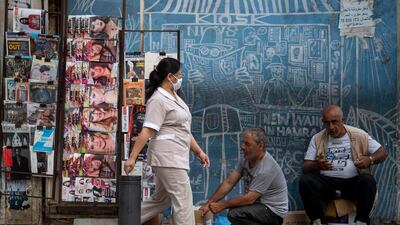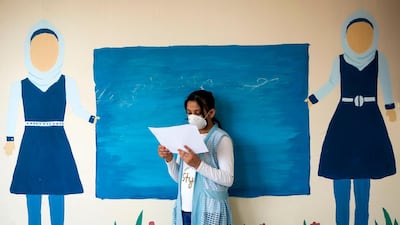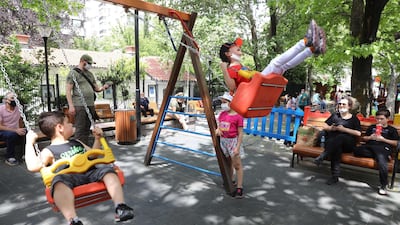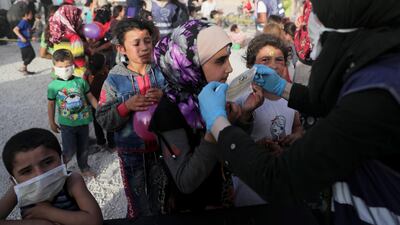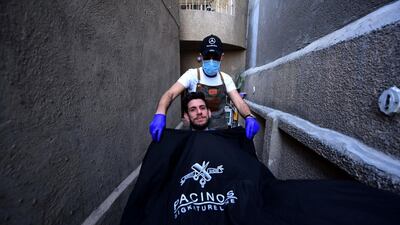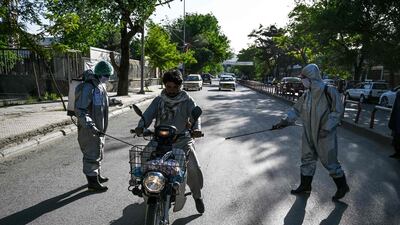A senior Dubai health chief has vowed the emirate remains on the “right track” in its fight to contain Covid-19, but joined nationwide calls for the public to stay at home during Eid to help flatten the curve.
Humaid Al Qatami, director general of Dubai Health Authority, said the rise in cases in recent days could be managed and highlighted the growing number of recoveries from the virus.
But Mr Al Qatami admitted officials were looking closely at the reasons behind a surge in cases during Ramadan and wanted public support to drive down infection rates.
“During Ramadan, through monitoring we noted an increase in cases," he said during a Dubai briefing on Thursday.
“Of course, we try to understand the reasons behind it. During Ramadan families visit. It is part of tradition and customs.
“During Eid people get closer to each other. I call on all citizens and residents in the UAE to comply with all precautionary measures in place.
"Adopt physical distancing, avoid visits, avoid gatherings and communicate by video and audio calls.”
Mr Al Qatami said most cases in the country were mild, meaning undue strain was not placed on hospitals.
“The health sector is in a very good status," he said. "The number of cases is normal.
"We are carrying out tests continuously, especially in areas of high risk, such as labour accommodations.
“We are on the right track. We have a stable increase which will not impact the health system.
"The average number of recoveries is increasing. Things are getting better.”
Lt Gen Abdullah Al Marri, chief of Dubai Police, said 500 patrols were on the streets every day to ensure members of the public stayed at home.
“We are monitoring all violators, those who are being reckless," Gen Al Marri said.
"We thank the public for their commitment but we always wish for better and want full compliance."
He called on the community to stay indoors during Eid for the good of themselves, their families and others.
Gen Al Marri said hefty fines given to those who breached regulations, such as by not wearing masks or by going outside between 8pm and 6am, should not be regarded as punishment, but as part of an effort to ensure such the measures are obeyed.
“We are sure UAE residents will be role models in solidarity and harmony," he said.
"We want to guarantee the implementation of precautionary measures, not by 99 per cent of the public but by 100 per cent.
"Without this we cannot reduce cases and get out of these times with the least loss."
The officials repeated a plea made hours earlier by Sheikh Mohamed bin Zayed, the Crown Prince of Abu Dhabi.
During his final Ramadan Majlis of the year, Sheikh Mohamed, also the Deputy Supreme Commander of the Armed Forces, said it was crucial that people remained indoors to protect the health of the most vulnerable members of society.
“We want to keep our numbers low and they are starting to be somewhat promising,” he said. “However, this changed in Ramadan.
"So what I ask of our residents and citizens is to stay home during the last week of Ramadan and during Eid, especially for older people, children and people with special needs.
“I know it is hard but for us it means saving lives. For us, it means keeping our loved ones safe.
“We do not want everything that we did in the past months to be in vain due to a simple mistake that would cost us too much.”
UAE officials late on Thursday announced 894 new Covid-19 infections, after 43,000 tests in 24 hours.
That took the country’s total to 26,898 infections after more than 1.6 million people were screened.
New figures also showed another 946 patients had recovered from the disease while four more died.
To date, the UAE has recorded 12,755 recoveries and 237 deaths.


